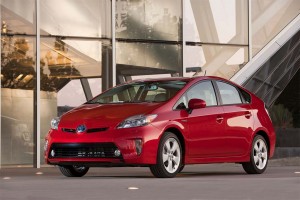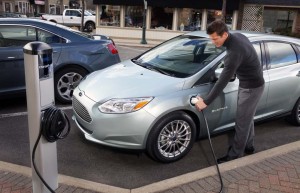Toyota has once again been picked as the world’s greenest brand, according to an annual consumer study that found five automotive brands among the Top 10.
While the automobile itself may be linked to an assortment of environmental issues, from smog to global warming, automotive manufacturers are gaining increased recognition for their focus on sustainability, whether reducing fuel consumption, eliminating plant wastes or recycling materials like rubber, plastic and metal into new components.
Repeating in the number one spot, “Toyota is a leading example of what can result,” noted an announcement from Interbrand, a major brand consultancy and author of an assortment of studies rankings global brands. The newest is the third annual Best Global Green Brands report.
Toyota has set a corporate priority of painting itself green and has supported that target in a variety of ways. Among other things, it produces the Prius, the world’s best-selling hybrid-electric vehicle. It also recently began production of the RAV4-EV, a pure battery-electric vehicle. The Interbrand study also pointed to the maker’s effort to create a low-carbon showcase community, dubbed Toyota Ecoful Town, near its headquarters in Toyota City, Japan.
But the Interbrand study shows that even dominant green brands have to be looking over their corporate shoulders. Ford, which has launched a number of hybrids, plug-ins and even the new Focus EV battery-car, came in at second in the 2013 Global Green Brands report.
“What makes the annual Best Global Green Brands report unique and valuable is that it examines performance and perception in action,” said Jez Frampton, Global Chief Executive Officer of Interbrand. “The report provides leading brands with the insights they need to develop robust strategies—strategies that will not only drive their businesses forward, but also have a positive impact on the environment and communities in which those businesses operate.”
There were three other automotive brands in the Top 10, including Honda at third. The maker launched its own first-generation hybrid, the Insight, the same year as Toyota but has had less sales success with the latest version and other gas-electric models. Nonetheless, Honda is still working to embellish its green bona fides, and recently announced plans to launch three distinct new hybrid drivetrain systems over the next couple years. That includes one for the reborn Acura NSX sports car that will be able to deliver a mix of performance and high fuel economy. Honda also launched its own new battery-electric vehicle, the Fit EV, earlier this year.
Nissan, maker of the Leaf battery-car, landed in fifth place, climbing 16 spots since the 2012 Global Green Brands study. That reflects not only Nissan’s industry-leading stand on electric vehicles but its emphasis on reducing the mass of all its products, something that can significantly enhance fuel efficiency.
Volkswagen squeaked in at the seventh spot on the list. European makers have, until recently, been reluctant to embrace battery power but the maker – and subsidiaries such as Audi and even Bentley – is making up for lost time with a range of hybrids and more advanced battery vehicles to come.
Automakers, at least those who’ve made sustainability a priority, have seen their image with consumer improve measurably, according to the Interbrand study. Other makers who landed in the Top 50 are Mercedes-Benz, Hyundai and Kia. Notably absent were any General Motors brands, including Chevrolet, maker of the high-profile Volt plug-in. And BMW didn’t make the cut, either, despite its upcoming launch of an all-new battery based brand that will market such vehicles as the i3 electric city car and i8 plug-in hybrid sports car.
Though the auto industry may have fared well in the upper tier of the Best Global Green Brands study, the technology sector dominated overall, with an even dozen brands on the list, including fourth-ranked Panasonic, Nokia in 9th, and Dell rounding out the Top 10.
So-called sustainable fashion companies, such as adidas, Nike, H&M and Zaar, also scored well with consumers.



Congrats to all the above for being good corporate citizens regarding the environment. That and $5 will get them a $1 cup of coffee. 😉